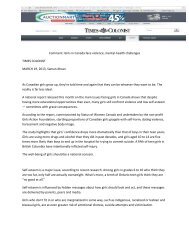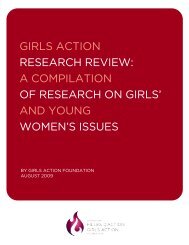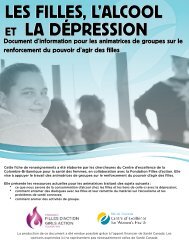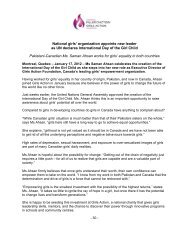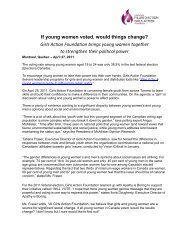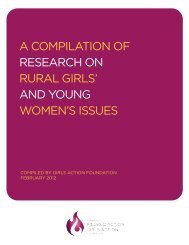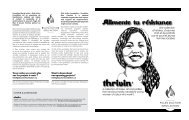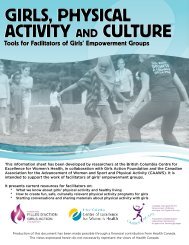Aboriginal - Girls Action Foundation
Aboriginal - Girls Action Foundation
Aboriginal - Girls Action Foundation
You also want an ePaper? Increase the reach of your titles
YUMPU automatically turns print PDFs into web optimized ePapers that Google loves.
and culture. Many of the <strong>Aboriginal</strong> women were important members of society such as<br />
a daughter of a Chief. Although <strong>Aboriginal</strong> women were viewed as leaders they were still<br />
forced to assimilate to European style by giving up their traditional clothing.<br />
During the 1800s, <strong>Aboriginal</strong> women and their Métis predecessors were important<br />
members of society, even though sexism, racism, and discrimination were incorporated<br />
into daily life. This was the time when <strong>Aboriginal</strong> women began to follow European<br />
traditions and take on more domestic roles such as cleaning and harvesting vegetables.<br />
During this time, <strong>Aboriginal</strong> women had few rights as men were considered their social,<br />
legal, and political masters. Any rights which an <strong>Aboriginal</strong> woman possessed were<br />
acquired directly from her husband. During this time, <strong>Aboriginal</strong> women did not have the<br />
right to vote; to own property; or to enter into any kind of contract. This attitude was<br />
ultimately reflected in the Indian Act, which segregated <strong>Aboriginal</strong> women from actively<br />
participating in politics.<br />
Through the Indian Act, <strong>Aboriginal</strong> women were denied equality. Many <strong>Aboriginal</strong><br />
women were denied their Indian status upon marrying a man of non status ancestry.<br />
European economic and cultural expansion was especially devastating for <strong>Aboriginal</strong><br />
women. Their value as equal partners in traditional <strong>Aboriginal</strong> societies was completely<br />
undermined. <strong>Aboriginal</strong> women were further oppressed with the creation of the<br />
residential school system. Children attending a residential school were denied the<br />
right to learn their language, learn their traditions and learn their culture. During this<br />
time, <strong>Aboriginal</strong> women were denied the right to learn leadership from their mothers.<br />
Parenting skills were never taught at these institutions. Many <strong>Aboriginal</strong> women who<br />
attended residential schools suffered emotional, physical, and sexual abuse.<br />
<strong>Aboriginal</strong> women remained strong leaders despite being discriminated against through<br />
government legislation, as well, as the educational school system. <strong>Aboriginal</strong> women<br />
began to turn back to their traditional culture and began to assume the role of equals<br />
in their personal life, as well as in society. <strong>Aboriginal</strong> women began to take on the role<br />
of leaders and they began to fight for their right to vote and to be recognized as legal<br />
persons. The role of leadership did not fall in the hands of just one woman, but in the<br />
hands of all <strong>Aboriginal</strong> women.<br />
78 Shauna Ponask



